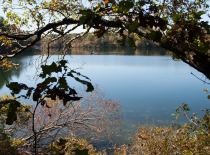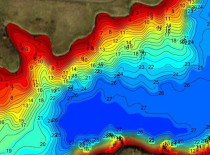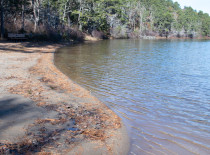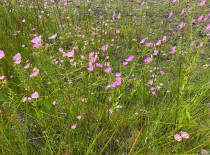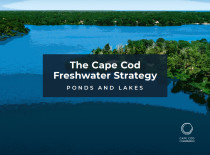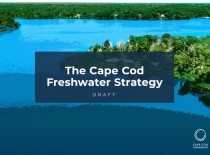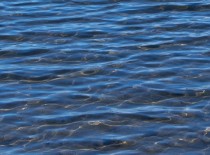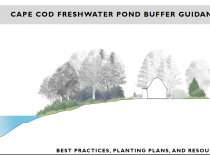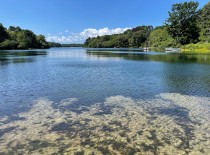Category: Freshwater Initiative
Launched in 2023 by the Cape Cod Commission and the Association to Preserve Cape Cod, the Regional Pond Monitoring Program monitors a representative sample of ponds to provide insight into water quality and how it is influenced by pond size, land use, and watershed characteristics. This year, the number of monitored ponds has expanded from 50 to 75. Alongside physical and chemical measurements, the program now includes enhanced monitoring of zooplankton.
Across the region, efforts to collect and compile pond data are expanding. One of the most significant data gaps in fully assessing pond health is bathymetry, the measurement of the depth and shape of a water body’s bottom, essentially, an underwater topographic map. Bathymetric data describe how deep a pond is at various locations, the contours of the pond floor, and changes in depth that influence how water moves and mixes. To address this need, the Cape Cod Commission is initiating a project to survey bathymetry in approximately 30 ponds across the region.
For the past three years, the Cape Cod Commission and the Association to Preserve Cape Cod have collaborated on the Cape Cod Regional Pond Monitoring Program (RPMP), an effort to collect consistent data from 50 representative ponds across the region. Since the spring of 2023, monitors, including hundreds of volunteers, have made nearly 1,000 visits to ponds, collecting almost 3,000 samples. Now, at the end of its initial three-year run, the program has brought new insight, new capabilities, and a new level of community involvement to understanding pond health across Cape Cod. Now, the Commission is seeking to expand the program and continue it for years to come.
Recognizing the important ecosystem services native plants provide, Commission staff are developing an updated list of native plants for use in local and regional planning. Using the comprehensive plant list featured in the Cape Cod Freshwater Pond Buffer Guidance as its foundation, the updated list will include additional native species and indicate which are suited for upland and coastal environments as well as freshwater pond buffers. Created as part of the Freshwater Initiative, the Pond Buffer Guidance highlights the ecological benefits of native plants and their role in supporting healthy habitats.
Natural systems are central to Cape Cod’s identity and resilience, shaping the region’s environment, economy, and quality of life. A series of lightning talks by Commission staff highlighted efforts to protect ponds, enhance outdoor access, and build resilience in the face of climate stress, sharing practical actions communities and residents can take.
The Cape Cod Commission is pleased to announce the release of the final Freshwater Strategy, a comprehensive, data-driven plan that defines a path forward for Cape Cod to support healthy, functioning ponds and lakes.
The Cape Cod Commission is pleased to announce the release of the draft Cape Cod Freshwater Strategy, a comprehensive, data-driven plan that defines a path forward for Cape Cod to support healthy, functioning freshwater ecosystems. The draft strategy is available for public comment. Comments will be accepted through Monday, March 17, 2025.
On January 13, 2025, the CCIWPF Board voted to approve two key motions to enhance financial support for water quality monitoring programs, highlighting their connection to the Fund's mission. These programs aim to improve the understanding of both coastal and freshwater ecosystems, ensuring informed, science-based decision-making for the region.
As work on the Cape Cod Freshwater Initiative nears completion, the Cape Cod Commission is pleased to present new tools and resources to support the region’s freshwater ponds.
The Cape Cod Commission launched the Freshwater Initiative in 2022, responding to growing concerns about the health of the region's 890 ponds and lakes. Cape Cod's freshwater resources are dynamic natural systems that contribute to the region's identity. A strategy to support protection and restoration of Cape Cod’s ponds is nearly complete. It includes data, research, and re
